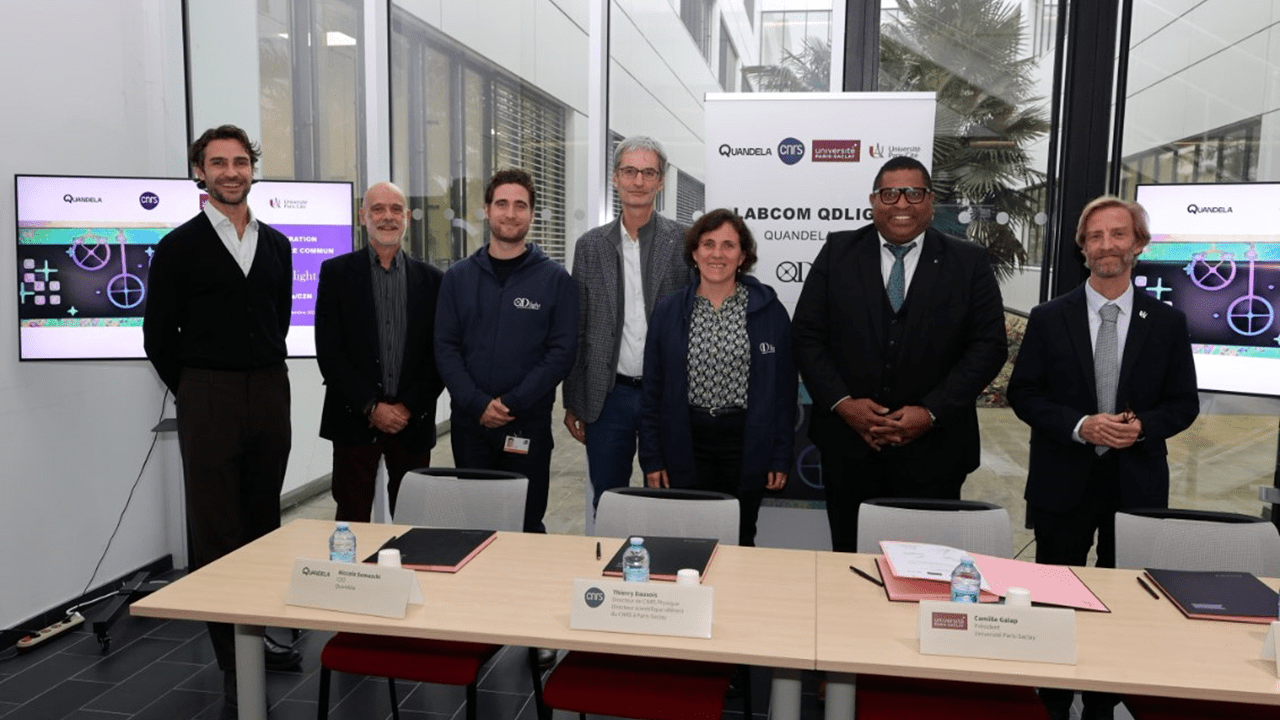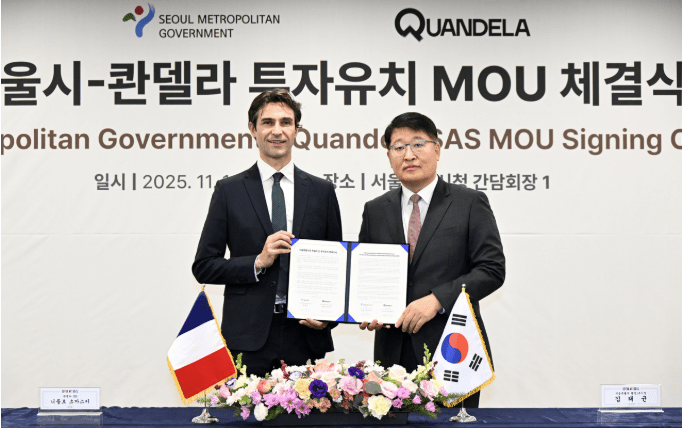- Quantum photonics, or the art of controlling light in the quantum regime, should revolutionise data processing and security, with an impact across a range of industries.
- Quandela, a European leader company for photonic quantum computing, is combining its know-how with that of the CNRS, Université Paris-Saclay, and Université Paris Cité in order to intensify scientific research and innovation in this field.
- The objective is to preserve French sovereignty in the design of photonic quantum computers, namely by increasing their computing power.
On November 13th 2024, Quandela, the CNRS, Université Paris-Saclay, and Université Paris Cité inaugurated at the Centre for Nanoscience and Nanotechnology (CNRS/Université Paris-Saclay/Université Paric Cité) the QDlight associated research laboratory focusing on research in quantum photonics, which is to say the art of controlling light in the quantum regime inside nanoscale devices. Over the course of six years, the teams will expand scientific cooperation with a view to developing next generation quantum light emitters, as well as their applications in quantum information technology to secure unprecedented computing power.
Quantum photonics, or the art of controlling light in the quantum regime
Quantum photonics, which has been developed since the late twentieth century, seeks to take advantage of the specifically quantum properties of light—especially single photons (emitted one by one)—for quantum computing and communications security. This discipline offers one of the most promising avenues for quantum computing (quantum computers and networks), as well as for inviolable key distribution protocols in encryption (quantum cryptography).
Quandela, a leading European company for photonic quantum computing that emerged from the Centre for Nanoscience and Nanotechnology (CNRS/Université Paris-Saclay/Université Paris Cité), has produced and marketed quantum light emitters in Europe since 2017–components that are indispensable to photonic quantum computing technology–and also launched the production of photonic quantum computers in 2023. These emitters, which consist of a quantum dot that behaves like an artificial atom in a semiconductor matrix, can generate a series of on-demand and indistinguishable single photons through a succession of laser pulses concentrating on this artificial atom.
In the optimal resonance and photon extraction conditions provided by the optical cavity in which it is positioned, these quantum dots can generate a photon flux with a rate of a few dozen megahertz, which efficiently implement quantum computing protocols on a photonic chip.
Toward unprecedented computing power and efficiency
This new associated research laboratory aims to develop emitters and protocols to generate new quantum states of light, with a view to creating a fault-tolerant photonic quantum computer1, and to demonstrating quantum communication protocols.
Pour ce faire, les travaux s’inscriront dans deux axes de recherche :
- The project’s “optical” focus will first develop quantum photonic entanglement protocols,2 in order to create multi-partite entangled photon chains and graphs . These non-classical states of light are central to the “made-to-measure” quantum computing paradigm, which is the most promising framework for creating a universal quantum machine.
- The “growth” research focus will concentrate on the quality of the quantum-dot-based photonic devices that will be produced within the Labcom. This will notably involve growing materials of very high purity–on which the “quantum purity” of photons depends–as well as increasing the reproducibility of photonic device production.
QDlight, pursuing close public-private research collaboration
This associated research laboratory (Labcom) is in line with the collaboration, since 2017, between Quandela and the research laboratory from which it emerged, the Centre for Nanoscience and Nanotechnology. This collaboration led to numerous interactions between researchers and engineers for basic research on the physics of semiconductor quantum dots, light-matter interaction in solid microcavities, protocols for the generation and measurement of quantum light, and for the first implementation of quantum protocols and computing.
The QDlight Labcom represents the next phase in conserving a global competitive head-start in semiconductor single-photon source technology, in addition to ensuring their constant improvement and using their exceptional properties in research and development activities.
“The CNRS is thrilled by the creation of QDlight, which combines the excellence of teams from the C2N laboratory with the Quandela company, a European leader in photonic quantum computing that emerged from the academic world, and doubly contributes to positioning French public research in quantum technology at the highest global level”, explains Antoine Petit, the CNRS Chairman and CEO.
“This research aims to preserve our global technological leadership in quantum photonics”, indicates Quandela co-founder and CEO Niccolo Somaschi.
“It is a great pleasure to be here at C2N, a leading site for French research in nanoscience and nanotechnology, in order to inaugurate this new Labcom, a symbol of successful synergy between national research organisations, universities, and deeptech enterprises. It will combine high-level academic and technological expertise in order to overcome scientific and technological obstacles in this crucial field of quantum photonics, all while contributing to the training of students and young researchers”, says Camille Galap, the President of Université Paris-Saclay.
“Université Paris Cité is proud to have contributed to the creation of this joint laboratory, which illustrates the capacity for collaboration between universities, NROs and the private sector. It is essential to combine our strengths and expertise for the benefit of research and innovation, particularly in a field as strategic as quantum technology”, explains Édouard Kaminski, President of Université Paris Cité.
“ We are proud of the creation of this associated research laboratory, which gives concrete form to years of a trusting relationship, and will help us support efforts to strengthen Quandela’s knowledge and expertise in quantum photonics alongside our partners”, emphasises Thierry Dauxois, Director of CNRS Physique.
ABOUT THE CNRS
A major player in basic research worldwide, the National Centre for Scientific Research (CNRS) is the only French organisation active in all scientific fields. Its unique position as a multi-specialist enables it to bring together all of the scientific disciplines in order to shed light on and understand the challenges of today’s world, in connection with public and socio-economic stakeholders. Together, the different sciences contribute to sustainable progress that benefits society as a whole. (www.cnrs.fr/en)
ABOUT UNIVERSITÉ PARIS-SACLAY
Université Paris-Saclay was born from the shared ambition of French universities, grandes écoles and national research organisations. As a leading university in Europe and the world, it covers the fields of science and engineering, life sciences and health, and humanities and social sciences. The university’s science policy closely intertwines research and innovation, incorporating both basic and applied science to tackle major societal challenges. Université Paris-Saclay offers a varied range of undergraduate to doctorate level degrees, including programmes with its grandes écoles, all of which are focused on achieving student success and employability. The university prepares students for an ever-changing world where the ability to think critically, remain agile and renew one’s skills are crucial. Université Paris-Saclay also offers a comprehensive range of lifelong learning courses. Located to the south of Paris, the university extends across a vast and rich local area. Its location strengthens both its international visibility and its close ties with its socio-economic partners (major companies, SMEs, start-ups, local authorities, charities). (www.universite-paris-saclay.fr/en/)
ABOUT UNIVERSITE PARIS CITÉ
At the heart of a global network of knowledge and innovation, Université Paris Cité is one of France’s leading multidisciplinary universities. Born in 2019 from the merger of the universities of Paris Diderot, Paris Descartes and Institut de physique du globe de Paris, the ambition of Université Paris Cité is to lead and develop an exceptional potential to meet the challenges of tomorrow’s society. It covers a wide range of disciplines, with one of the most comprehensive and ambitious educational offerings available in the world. Université Paris Cité is part of the incarnation of a world city, aware of its place and missions, open to youth and knowledge. It has 63,000 students, 7,500 teaching and research staff, 21 doctoral schools and 117 research units. u-paris.fr (u-paris.fr/en)




